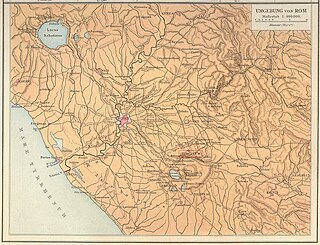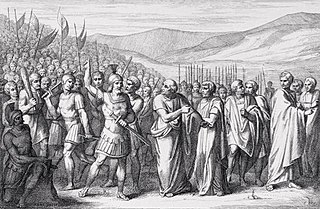Related Research Articles

Spurius Cassius Vecellinus or Vicellinus was one of the most distinguished men of the early Roman Republic. He was three times consul, and celebrated two triumphs. He was the first magister equitum, and the author of the first agrarian law. The year following his last consulship, he was accused of aiming at regal power, and was put to death by the patricians.
Gaius Nautius Rutilus was a Roman politician who was consul of the Roman Republic from 475 BC until 474 BC and from 458 BC until 457 BC.
Agrarian laws were laws among the Romans regulating the division of the public lands, or ager publicus. In its broader definition, it can also refer to the agricultural laws relating to peasants and husbandmen, or to the general farming class of people of any society.
Quintus Fabius Vibulanus, son of Marcus Fabius Vibulanus, was consul of the Roman Republic and one of the second set of decemviri.

The Battle of Mount Algidus was fought in 458 BC, between the Roman Republic and the Aequi, near Mount Algidus in Latium. The Roman dictator Lucius Quinctius Cincinnatus turned an expected Roman defeat into an important victory.
Appius Claudius Sabinus Regillensis or Inregillensis was the legendary founder of the Roman gens Claudia, and consul in 495 BC. He was the leading figure of the aristocratic party in the early Roman Republic.
Appius Claudius Crassus InregillensisSabinus was a Roman senator during the early Republic, most notable as the leading member of the ten-man board which drew up the Twelve Tables of Roman law around 451 BC. He is also probably identical with the Appius Claudius who was consul in 471 BC.
The gens Vitellia was a family of ancient Rome, which rose from obscurity in imperial times, and briefly held the Empire itself in AD 69. The first of this gens to obtain the consulship was Aulus Vitellius, uncle of the emperor Vitellius, in AD 32.
Marcus Valerius Volusus was a Roman consul with Publius Postumius Tubertus in 505 BC.

The gens Cloelia, originally Cluilia, and occasionally written Clouilia or Cloulia, was a patrician family at ancient Rome. The gens was prominent throughout the period of the Republic. The first of the Cloelii to hold the consulship was Quintus Cloelius Siculus, in 498 BC.
Caeso Fabius Vibulanus was consul of the Roman Republic in 484, 481, and 479 BC. He had earlier held the office of quaestor parricidii in 485 BC in connection with the trial and execution of Spurius Cassius Vecellinus.
Lucius Furius Medullinus, of the patrician gens Furia, was a politician and general of the Roman Republic who was consul twice and Consular Tribune seven times.
Aulus Verginius Tricostus Caeliomontanus was a Roman Republican politician and general of the gens Verginia. He served as a Roman consul in 494 BC together with Titus Veturius Geminus Cicurinus.
Titus Quinctius Capitolinus Barbatus was a Roman statesman and general who served as consul six times. Titus Quinctius was a member of the gens Quinctia, one of the oldest patrician families in Rome.
Quintus Servilius Priscus was a Roman statesman who served as Consul in 468 BC and 466 BC.
The Roman-Aequian wars were a series of wars during the early expansion of ancient Rome in central Italy fought against the Aequi, an Italic tribe located to their east.

The first secessio plebis was a significant event in ancient Roman political and social history that occurred between 495 and 493 BC. It involved a dispute between the patrician ruling class and the plebeian underclass, and was one of a number of secessions by the plebs and part of a broader political conflict known as the conflict of the orders.
Gaius Julius Iullus was a Roman statesman, who held the consulship in 482 BC. After a contentious election, he was chosen to represent the more moderate faction in Roman politics, while his colleague, Quintus Fabius Vibulanus, was elected by the aristocratic party. Both consuls led a Roman army against Veii, but withdrew when the Veientes refused to confront them. Thirty years later, in 451, Julius was chosen a member of the first decemvirate, alongside several other ex-consuls and other respected statesmen. Julius proved himself a man of good judgment and integrity, and helped to draw up the first ten tables of Roman law.
Gaius Claudius Ap. f. M. n. Sabinus Regillensis, was a member of the great patrician house of the Claudii at Ancient Rome. He held the consulship in 460 BC.
Quintus Fabius Vibulanus was a consul of the Roman Republic in 423 BC and a consular tribune in 416 and 414 BC.
References
- ↑ William Smith, Dictionary of Greek and Roman Biography and Mythology
- 1 2 Livy, Ab urbe condita , 2.41
- ↑ Livy, 2.42
- ↑ Livy, 2.62
- ↑ Livy, 3.4-5
- ↑ Broughton, vol i, pp.34